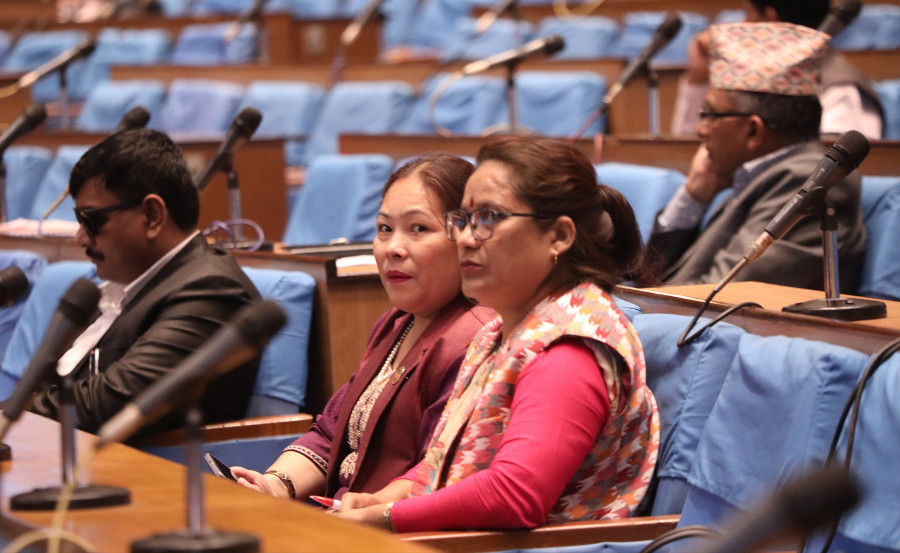National
Opposition bats for consensus government to effect charter reforms. Iron not hot, say ruling party lawmakers, experts
Agenda gains traction especially after political changes in Kathmandu shook provincial governments to their roots.
Post Report
After the change in coalition at the centre began to affect provincial governments, voices for reforming the electoral system through constitutional amendment are growing louder.
The subnational governments are still feeling the effects of the change in coalition partners in Kathmandu on March 4. During the readjustment in the Pushpa Kamal Dahal-led coalition, the second-largest party in the House of Representatives, CPN-UML, joined the government while the largest force, the Nepali Congress, was ousted from power.
Meanwhile, after the Janata Samajbadi Party Nepal, led by Upendra Yadav, withdrew its support for the Dahal government, ruling partners UML and the CPN (Maoist Centre) also withdrew their support for the Madhesh provincial government, led by Yadav’s party. Following that, Saroj Kumar Yadav, the chief minister of Madhesh, is set to take a vote of confidence on Wednesday.
Speaking at the House of Representatives during ‘special hour’ on Tuesday, Nepali Congress lawmaker Sanjay Kumar Gautam called for the formation of a national consensus government and constitutional amendments, stating that political instability and inefficient governance have frustrated the people.
Gautam has made a fervent appeal to all political parties, urging them to put aside their partisan agendas and unite under a common national goal.
Over the past eight years since the promulgation of the constitution and 16 years after the establishment of the republican order in the country, Nepalis have become disillusioned with politicians’ actions. Gautam observed that they are deeply dissatisfied with the political parties, perceiving a lack of accountability and the failure to address key issues.
Questioning the current form of governance, lawmaker Gautam predicted that the present political system would not last long. “We are wasting time while the country is on a downward trajectory,” Gautam added. “To give the people hope, let us envision a broader democratic alliance and let us form a national consensus government to amend the constitution.”
With a fractured election mandate resulting in political instability from the federal to provincial governments, there is growing sentiment in favour of amending the constitution to change the electoral system.
The electoral system is the reason behind political instability, as some political leaders argue. They also point to the need for a constitutional amendment to address the issue. For instance, the mixed electoral system is often blamed for unstable governments, says Gautam.
“The electoral system we are practising has been giving us fractured mandates, resulting in no single party winning a majority in Parliament,” Gautam told the Post. “Therefore, public sentiment is building in favour of amending the constitution to reform the electoral system. I tried to give voice to that sentiment in Parliament.”
Gautam warned that if the present form of governance continues, the country will inevitably plunge into a crisis. “These are my personal opinions and have nothing to do with the party I am affiliated with,” he clarified.
Parliamentarians discuss constitutional amendments for electoral reform, but no party owns the agenda, says UML lawmaker Raghuji Pant.
“Informally, many parliamentarians agree on the issue, but the topic is yet to gain momentum,” Pant told the Post.
However, leaders of the prime minister’s Maoist Centre party claim that a consensus government and constitutional amendment are not possible without the Congress participating.
“Amending the constitution is not possible immediately as it needs a two-thirds majority,” Devendra Paudel, a Maoist lawmaker, told the Post.
At least 182 lawmakers are needed in the 275-strong House to effect a constitutional amendment. For that, the Nepali Congress, with 88 seats, and the CPN-UML, the second largest with 78 seats, must come together. Even then, the support of 16 more lawmakers is necessary to amend the charter.
CK Lal, a political analyst, sees a slim chance for constitutional amendments amid deep polarisation in Nepali society.
“Nonetheless, a national consensus government can be formed to cover up the wrongdoings of the political parties while they were in government,” Lal told the Post.




 10.12°C Kathmandu
10.12°C Kathmandu














